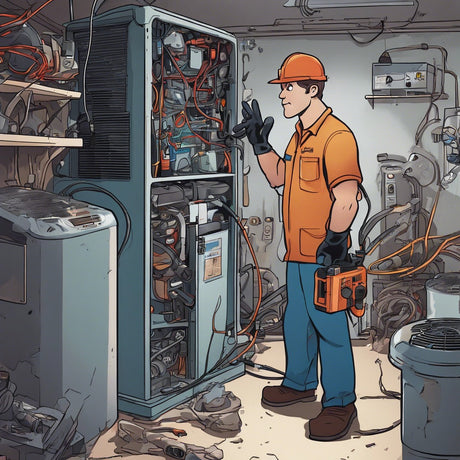- No products in the cart.
How to Troubleshoot Common HVAC Problems Before Calling a Technician
25
Mar
Your HVAC (Heating, Ventilation, and Air Conditioning) system plays a crucial role in keeping your home comfortable year-round. However, like any mechanical system, it can encounter issues from time to time. Before reaching for the phone to call a technician, there are several common HVAC problems you can troubleshoot yourself. Not only can this save you time and money, but it can also help you understand your HVAC system better. Here's a guide on how to troubleshoot some common HVAC problems:
1. Lack of Heating or Cooling:
-
Check the Thermostat: Ensure that the thermostat is set to the correct temperature and mode (heating or cooling). Replace the batteries if necessary and try resetting the thermostat.
-
Inspect Air Filters: Dirty or clogged air filters can restrict airflow and reduce system efficiency. Check and replace air filters regularly, typically every 1 to 3 months.
-
Inspect Air Vents and Registers: Ensure that all vents and registers are open and unobstructed to allow proper airflow throughout your home.
-
Check Circuit Breakers and Fuses: Make sure that the circuit breaker or fuse for your HVAC system is not tripped or blown. Reset the breaker or replace the fuse if needed.
2. Uneven Heating or Cooling:
-
Check for Blocked Vents: Furniture, curtains, or other objects blocking vents can disrupt airflow and cause uneven heating or cooling. Ensure that all vents are clear and unobstructed.
-
Inspect Ductwork: Leaks or gaps in ductwork can result in uneven airflow. Inspect visible ductwork for signs of damage or leaks, and seal any gaps with duct tape or mastic sealant.
-
Consider Zoning: If your home has multiple zones, ensure that each zone's thermostat is set correctly to maintain consistent temperatures throughout your home.
3. Strange Noises:
-
Listen for Unusual Sounds: Rattling, banging, or squealing noises coming from your HVAC system could indicate loose or damaged components. Turn off the system and inspect for any visible damage or loose parts.
-
Check the Fan: A noisy fan could indicate a worn-out motor or loose blades. Turn off the power to the system and inspect the fan for any visible damage or debris.
-
Schedule Maintenance: Regular maintenance by a professional technician can help prevent strange noises by identifying and addressing potential issues before they escalate.
4. HVAC System Not Turning On:
-
Check Power Supply: Ensure that the HVAC system is receiving power. Check the circuit breaker, fuse, and power switch to make sure they are all in the "on" position.
-
Inspect Thermostat Wiring: Check the wiring connections at the thermostat and ensure that they are secure. Loose or damaged wiring could prevent the thermostat from communicating with the HVAC system.
-
Reset the System: Try resetting the HVAC system by turning off the power for a few minutes and then turning it back on. This can sometimes resolve minor electrical glitches.
5. Refrigerant Leaks:
-
Check for Ice Buildup: Ice buildup on the refrigerant lines or evaporator coil could indicate a refrigerant leak. Turn off the system and contact a professional technician to inspect and repair the leak.
-
Look for Oil Stains: Oil stains or puddles near the HVAC unit could also indicate a refrigerant leak. If you suspect a leak, avoid attempting to repair it yourself and seek assistance from a qualified technician.
6. Regular Maintenance:
- Schedule Professional Maintenance: Regular maintenance by a qualified technician is essential for ensuring the efficiency and longevity of your HVAC system. Consider scheduling annual or bi-annual maintenance appointments to keep your system running smoothly.
By following these troubleshooting steps, you may be able to resolve common HVAC issues on your own and avoid the need for costly repairs or service calls. However, if you're unable to diagnose or fix the problem yourself, don't hesitate to contact a professional HVAC technician for assistance. Remember, safety should always be a top priority when troubleshooting or performing maintenance on your HVAC system.













